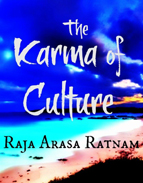"It is now Anglo-Celt Australia which therefore has to change. It needs to rebuild its communities to enable the close inter-relation- ships between individuals, which used to prevail before individualism took over their souls."

 |
The Karma of Culture by Raja Arasa Ratnam Kindle Direct
book review by Barbara Bamberger Scott
This is an enjoyably erudite text that will mean most to thoughtful Australians of all cultures. Ratnam served for nine years as Director of Policy on Australian migrant settlement related issues. Surprisingly, to an American reader, his descriptions of some of the worst ills of current Australian society sound almost exactly like the ills of American society: a large and seemingly expanding lower class of people dependent on government subsidies, subsidies in the main funded by an increasingly burdened middle class, while a small number of very wealthy people look on and offer no assistance to either. To inhabitants of eastern Asia, Australia beckons, its welcome including housing, health care, and other aid to newly arrived immigrants and even more to those who stay longer. But sadly, despite this open door, old biases remain intact: "The most ridiculous manifestation of such prejudice relates to attitudes to study displayed by Asian children. They are accused of studying inordinately hard, and not developing a rounded personality through participation in sport." Ratnam makes a plea for a true multiculturalism that does not force one group to tamp down its cultural practices or religious beliefs (many Asians claim to be Christian upon immigrating, change their diet or manner of dress, in order to make themselves more acceptable to the dominant group) and does not take the color of one's skin to be one's only calling card.
Ratnam's Hinduism is reflected in the book's title; he says the book came to him as a suggestion "by the spirit world." It would be hard to find a more cogent and simultaneously engaging treatise on this subject, so neatly organized and neatly phrased that even a neophyte can readily grasp its essence. The Karma of Culture will, one hopes, be read by serious students of Australian politics, culture, and sociological issues, and by some ordinary people who want to be better informed and can see the correlation between the problems in Ratnam's Australia and those of rest of the so-called civilized world.
All royalties for the book go to Doctors Without Borders.
RECOMMENDED by the US Review